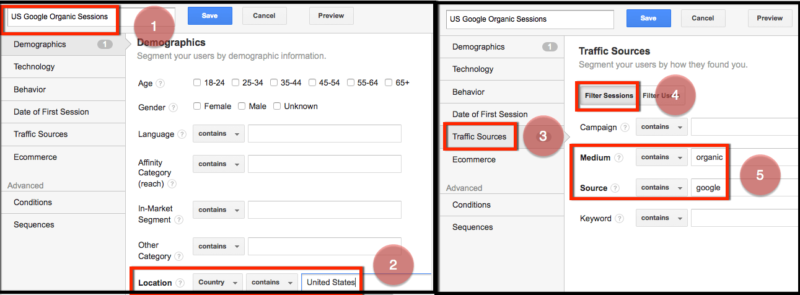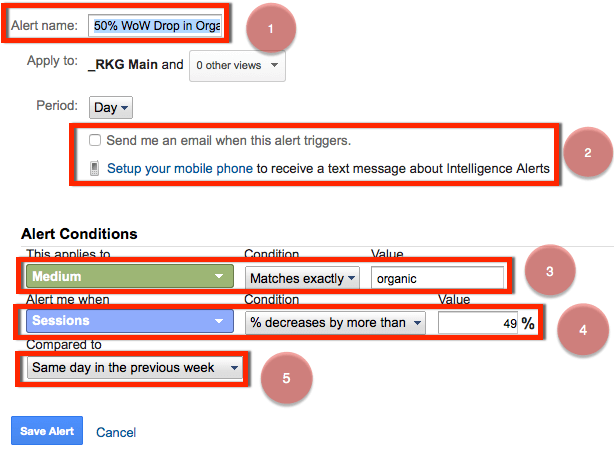Proactive Alerts For SEO Reporting Using Google Analytics
Having large quantities of data at our fingertips is great, but having the relevant bits automatically delivered to us is even better. Columnist Ben Goodsell shows how to configure Google Analytics to automatically alert you to significant organic traffic changes.

The Age of Information is undergoing a radical transition, from making data accessible to having relevant information presented to us when it matters. Getting notified of your parking location the minute you step off a plane. Getting an alert containing a list of items while walking through the front door of the grocery store. Modern technology has made this all possible.
So why should reporting for SEO be any different?
Enterprise-level SEO platforms like BrightEdge and SearchMetrics are making it easy to automate everyday reporting. They’re also getting very granular in their ability to alert users to any information of interest. Fortunately, for those short on cash or just getting started, Google Analytics has many of the same features.
In an attempt to give insight into the possibilities, this article will cover how to create a Custom Segment and an Alert to send an email or text message if your Organic sessions decrease more than 50% compared to the same day the previous week. If you already have segments created, skip down to the “Creating An Alert” section!
Creating A Custom Segment: 50% Drop In US Google Organic Traffic
To begin, let’s create a Custom Segment that includes only Organic Sessions of customers located in the United States.
From the Reporting Tab (1) in Google Analytics, select +Add Segment (2). Then, click +New Segment (3).
Name the new segment “US Google Organic Sessions” (1). In the Demographics section, where it says “Location,” specify Country contains United States (2). Now, in the Traffic Sources tab (3) be sure to Filter Sessions (4) by Medium contains organic and Source contains google (5).
As you can tell in the image above, there’s a wide array of possibilities to get notified about here when used in combination with Custom Alerts. Now that we’ve created the desired segment, let’s look at how they work together.
Creating An Alert: 50% WoW Drop In Organic Sessions
Now that we’ve decided on the information we want, let’s finish the job by telling Google Analytics when we’d like to be alerted.
In the Reporting tab (1) under Intelligence Events Overview (2), go to the Custom Alerts tab (3). Click Manage custom alerts (4), and finally, click the +NEW ALERT button.
Let’s name the alert “50% WoW Drop in US Google Organic Sessions” (1). Choose the types of alerts and where you’d like to send them (2), specify Medium matches exactly organic (3), then send the alert when Sessions % decreases by more than 49% (5).
Creating An Alert Using A Custom Segment
The +NEW ALERT view is also where you can associate a Custom Segment (like the one created in the first section of this tutorial) with a notification. Just as we chose the Organic Medium in the image above, it’s possible to instead choose a previously created Custom Segments.
Unfortunately, there’s a bug in Google Analytics where some Custom Segments will not show up in Custom Alert. To help fix the issue, please “vote up” the post in the product forums here.
Getting Granular With Proactive Reporting
Creating Custom Alerts in Google Analytics is a great way to be notified of a potential issue, as shown here, but it works equally well for knowing when improvements have been made!
For example, after focusing on optimizing a section of a site, it’s possible to create a custom segment to look at those pages specifically, then create an alert that will notify you when the expected gain has been realized.
It’s clear the future of SEO reporting is premeditated granular notifications. Are there any innovations you’re doing to be more proactive?
Contributing authors are invited to create content for Search Engine Land and are chosen for their expertise and contribution to the search community. Our contributors work under the oversight of the editorial staff and contributions are checked for quality and relevance to our readers. The opinions they express are their own.
Related stories
New on Search Engine Land





